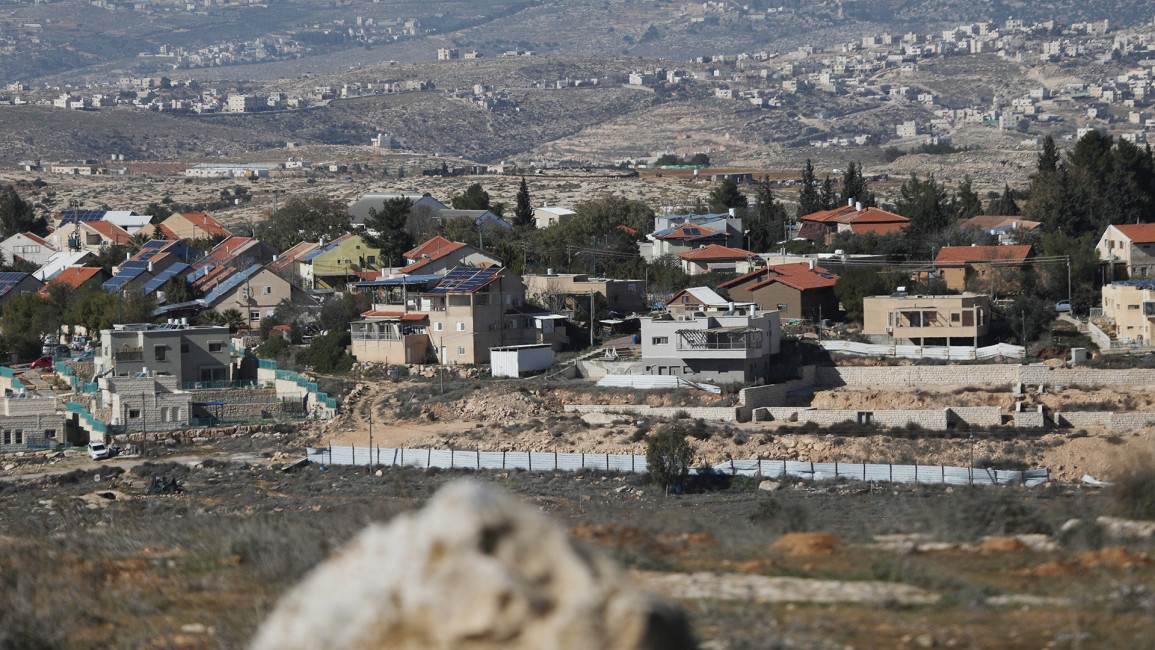Israeli settler population expanded greatly during Trump era: report
Israel's West Bank settler population has grown at a far higher rate than the country as a whole over the last four years, a pro-settler group said on Wednesday, a period that coincides with the Trump administration's unprecedented support for settlement activity.
The report by West Bank Jewish Population Stats shows the settler population growing by around 13% since the start of 2017 to reach 475,481. During the same period, Israel's population grew by around 8% to reach nearly 9.3 million, according to the government.
The group's report, which is based on official government data, does not include annexed east Jerusalem, home to more than 200,000 settlers.
Baruch Gordon, the director of West Bank Jewish Population Stats, downplayed the influence of US policy, saying the annual growth rate actually declined in recent years even before the coronavirus pandemic. The West Bank settler population grew by 2.62% in 2020, according to his figures, compared to 1.7% in Israel as a whole. In 2016, the settler population grew 3.59%.
“I don’t think any American president can influence that much, because growth on the ground is [dependent on] internal Israeli government decisions on how much construction to do and not to do," he said.
Read more: Israel's demographic battle for Jerusalem leaves Palestinians struggling to survive
Many settlers are religious Jews who tend to have larger families, driving population growth, and many Israelis are drawn to the settlements because they offer cheap housing.
Gordon expects growth to continue even if President Joe Biden pressures Israel to rein it in. "The facts on the ground are stronger than any American foreign policy," he said.
|
|
Israel occupied the West Bank and east Jerusalem during the 1967 war. Both areas are inhabited by Palestinians who want them as part of a future state. Israeli settlements are illegal under international law and widely considered to be an obstacle to creating a viable, contiguous Palestinian state.
Attacks by Israeli settlers on Palestinian civilians in the West Bank have increased in recent weeks.
Former President Donald Trump's administration abandoned decades of US policy by accepting the settlements and released a much-condemned Middle East plan in which Israel would have been able to keep all of them, including smaller settlements deep inside the occupied territory. Last year, Mike Pompeo became the first US secretary of state to visit a settlement.
The Palestinians angrily rejected Trump’s plan, and Biden is likely to abandon it. He is opposed to settlement expansion and has said he hopes to revive peace negotiations.
By not objecting to new settlement construction — as his predecessors from both parties had done — Trump encouraged their growth, further complicating efforts to bring about a two-state solution, which is still widely seen internationally as the only way to resolve the decades-old Israeli-Palestinian conflict.
Israeli authorities advanced plans to build nearly 800 homes in West Bank settlements just days before Trump left office. Peace Now, an Israeli anti-settlement watchdog, says Israel approved or advanced construction of over 12,000 settlement homes in 2020, the highest number in a single year since it began recording statistics in 2012.
Israel is also pressing ahead with massive infrastructure projects that will more closely link the settlements to its major cities and set the stage for future growth.
Nabil Abu Rdeneh, a spokesman for Palestinian President Mahmoud Abbas, blamed the growth of settlements on “the previous U.S. administration and the current Israeli government,” reiterating that they are “illegal according to international law.”
One of Israel's major human rights groups, B'Tselem, released a report earlier this month arguing that Israel has become an “apartheid” system, in part because of the permanence of the settlements. While the settlers are Israeli citizens, the 2.5 million Palestinians in the West Bank live under different forms of Israeli military rule.
The inequity has been on display during Israel's response to the coronavirus. Settlers are included in Israel's highly successful vaccination campaign, while the Palestinians in the West Bank must rely on the Palestinian Authority, which is struggling to secure its own supply of vaccines. Israel says it is not responsible for immunizing the Palestinians, although human rights groups say it is legally obliged to do so under the Fourth Geneva Convention.
Follow us on Facebook, Twitter and Instagram to stay connected



